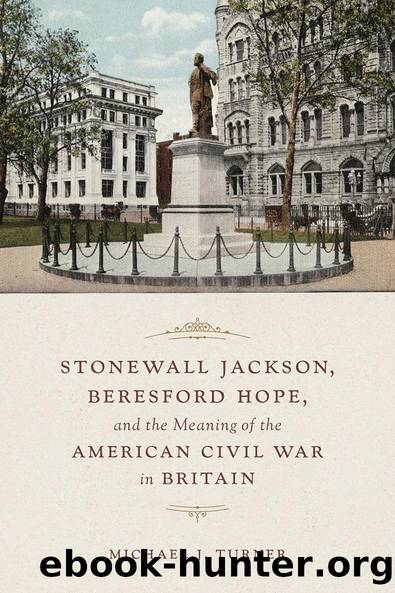Stonewall Jackson, Beresford Hope, and the Meaning of the American Civil War in Britain by Michael Turner

Author:Michael Turner [Turner, Michael]
Language: eng
Format: epub
ISBN: 9780807171080
Barnesnoble:
Publisher: Louisiana State University Press
Published: 2020-10-21T00:00:00+00:00
9
STONEWALL JACKSONâS POSTWAR LONGEVITY
Jacksonâs British reputation remained positive during the postwar period. There was discussion of his British ties. For his religious fervor, military talents, and successes in battle, there was continuing admiration. Information about his character, appearance, and habits was much sought after, and there was widespread use of his name beyond the turn of the century. He was the subject of songs, lectures, and readings and was often mentioned in material about America and British-U.S. relations after 1865. In different ways, Jackson was kept before the British public. The legend not only survived but flourished. In Britain, the values, behavior, and bearing associated with Jackson ensured that there would be no loss of heroic status.
People in Britain liked to remind themselves of the connection they had with Jackson. His happy memories of his British visit of 1856 were part of his legend. Into the early twentieth century, reference was still being made to the impression made upon him by Britainâs mighty religious edifices. Retired field marshal Lord Wolseley published two volumes of memoirs in 1903â4, and among the highlights noted by reviewers was his meeting with Jackson in 1862. In York, it was still a source of pride that Jackson the international celebrity had regarded a local treasure, the Minster, so highly.1 For Scots, it was equally important that Jackson had spent time in their country. Scottish author David Macrae included a section on Jackson in The Americans at Home, published in 1870. The book was based on Macraeâs travels in America during 1867â68, but in 1869, seeking more details about Jackson, he corresponded with the generalâs widow, Anna, and she confirmed that he had recorded his thoughts about Scotland in a journal and that âalthough he extended his travels to the Continent as far as Rome, he delighted specially in talking of your interesting country.â2
A biographical notice in the Standard in 1866 suggested that Jacksonâs time in Europe led him to reflect on the divisions in America. He had concluded that one day North and South would go their separate ways. His thinking along these lines was solidified by what he learned in Italy about the despotic Ferdinand II, king of the Two Sicilies (1830â59). An Englishman who met Jackson in Naples heard him say that âanother kind of tyranny . . . existed in a country which called itself free.â Apparently, Jackson in 1856 regarded secession as inevitable: âIn the questions at issue, not so much that of slavery, but that of the right of independence of States, he spoke of the Southern party as having justice plainly on its side.â3 This rendition of Jacksonâs perspective reflected the opinion of the Standard, which had favored the South during the war. It was more speculative than verifiable, but it served its purpose.
Postwar interest in Jackson usually conformed to the previous pattern, meaning that his religious faith remained a focal point. A detailed account of his life, based on information from multiple sources that had become available by 1865, was included in William Parker Snowâs Southern Generals.
Download
This site does not store any files on its server. We only index and link to content provided by other sites. Please contact the content providers to delete copyright contents if any and email us, we'll remove relevant links or contents immediately.
Room 212 by Kate Stewart(5105)
The Crown by Robert Lacey(4807)
Endurance: Shackleton's Incredible Voyage by Alfred Lansing(4769)
The Iron Duke by The Iron Duke(4350)
The Rape of Nanking by Iris Chang(4203)
Joan of Arc by Mary Gordon(4103)
Killing England by Bill O'Reilly(3997)
Say Nothing by Patrick Radden Keefe(3975)
I'll Give You the Sun by Jandy Nelson(3429)
Shadow of Night by Deborah Harkness(3361)
Hitler's Monsters by Eric Kurlander(3329)
Mary, Queen of Scots, and the Murder of Lord Darnley by Alison Weir(3208)
Blood and Sand by Alex Von Tunzelmann(3195)
Eleanor & Park by Rainbow Rowell(3153)
Darkest Hour by Anthony McCarten(3119)
Margaret Thatcher: The Autobiography by Thatcher Margaret(3080)
Book of Life by Deborah Harkness(2933)
Red Famine: Stalin's War on Ukraine by Anne Applebaum(2929)
The One Memory of Flora Banks by Emily Barr(2857)
